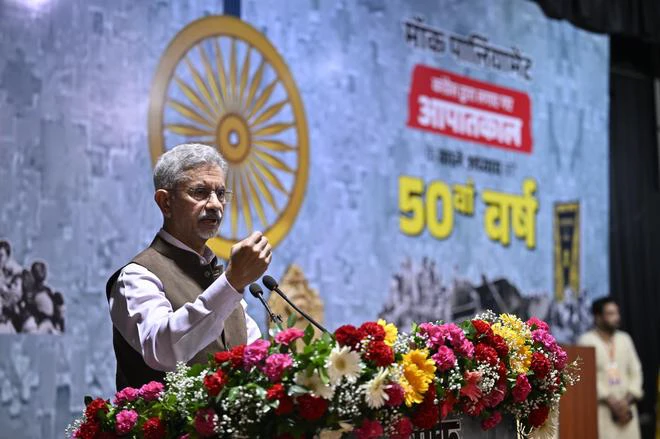The lesson I took away from Emergency was, “Never take freedom for granted,” EAM Jaishankar said
Everybody, especially youths, went through a lot of trauma was Emergency was imposed in 1975, External Affairs Minister Dr. S. Jaishankar said on Friday (June 27, 2025).
It’s not normal when students are sleeping in the hostel, and suddenly some of them are taken away for no reason. Imagine the trauma everyone had to go through, he said, speaking at the inaugural session of the Mock Parliament organized by Bharatiya Janata Yuva Morcha (BJYM).
This whole exercise was done to bring down the morale of the country, he said.
I was a student when the Emergency was imposed in 1975, and I will never forget what happened and what everyone had to go through. The lesson I took away from Emergency was, “Never take freedom for granted.”
Everybody assumes Emergency is related to politics, but it was always more than that. It affected every aspect of the country, including arts, culture, cinema, education. “It affected everybody’s way of life,” the External Affairs Minister said.
Emergency was imposed based on the rationale that there were imminent internal threats to the Indian state, and some minor internal issues were portrayed as security threats to the country. Many important leaders were arrested, he noted.
“Electricity was cut off to publishing houses, thereby censoring press freedom in the country. Newspapers were not allowed from being printed,” he said. Many newspapers protested Emergency in their own way, he added.
“Many films were not allowed to be released in the country during Emergency,” the Minister said.
Five Constitutional Amendments were passed during Emergency: EAM
During Emergency, in two years, five Constitutional Amendments and 48 Ordinances were passed. Out of the five, three were related to Emergency. “The 30th Amendment stated that people cannot approach courts against the declaration of Emergency. The 39th Amendment stated that people cannot go to court against the election of the Prime Minister and the 42nd Amendment stated that the Fundamental Rights of people would be diluted and the power of judiciary in the country would be reduced,” Dr. Jaishankar said. They attacked the very nature democracy of India, he added.
It was very hard to defend this exercise on a global platform, the External Affairs Minister said. “India was always known as the mother of democracy and defending this imposition on an international platform was a very difficult job for Foreign Ambassadors,” he added.
When then Prime Minister Indira Gandhi came back to power in 1980, she did not express even an ounce of regret for imposing Emergency, Dr. Jaishankar said. “The whole Gandhi family has never expressed any remorse for imposing Emergency on people,” he added.
Even though Emergency was imposed, it was protested by Indians across the nation. This proves that Democracy runs in the blood of the Indians, he said.
He called on the citizens to protect democracy and democratic institutions in the country.
The Union government in 2024 decided to observe June 25 as ‘Samvidhaan Hatya Diwas’.
